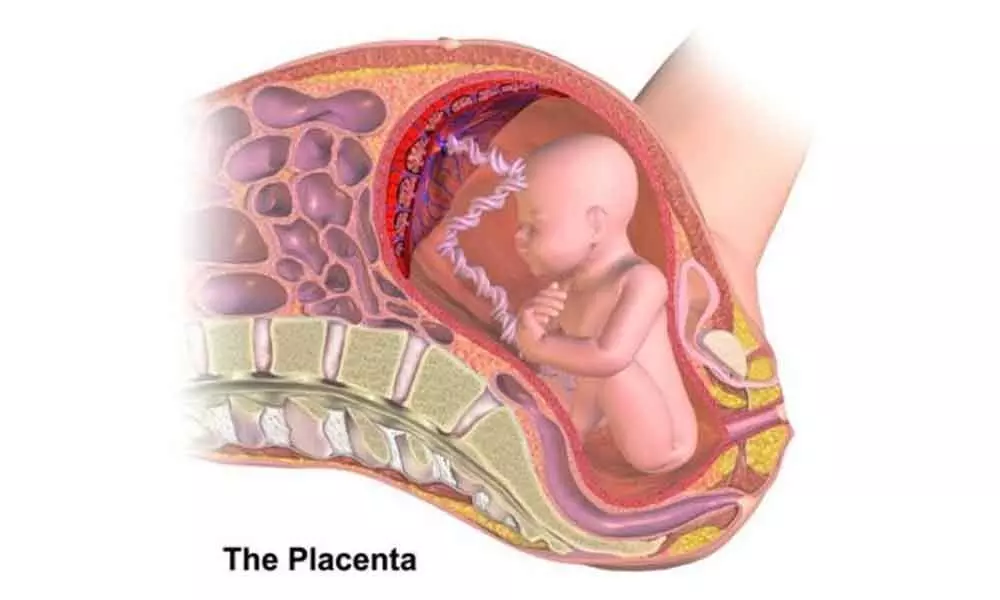Live
- India Faces Blow as Pacer Mohammed Shami Ruled Out for Remainder of Australia Series
- Biden Pardon: Joe Biden Commutes Death Sentences of 37 Inmates, Including Child Killers and Mass Murderers
- South Korea: Yoon believes impeachment trial takes priority over martial law probe
- Strict Action for Non-Adherence to Time Management - DMHO Dr. Swarajya Lakshmi
- Over 13.29 lakh houses approved for rural poor in Maharashtra: Shivraj Chouhan
- District Collector Urges Timely Completion of Indiramma Housing Scheme Survey
- Digital Arrest Scam: Hyderabad Man Duped of ₹7 Lakhs by Fake Crime Branch Police Callers
- Sukhbir Badal seeks President's Police medal for officer who saved his life
- US Firm Accordion Acquires Merilytics, Launches 1,500-Seater Office in Hyderabad
- Free Medical Camp Organized by Alampur Advocate Bar Association
Just In
Placenta changes in older moms not good for male child's heart


Changes occur in the placenta in mothers over age 35 leading to a greater likelihood of poor health in their male offspring and now, scientists have found in animal studies that placenta changes could put male child of older mothers at heart problems in later life.
London, Nov 30: Changes occur in the placenta in mothers over age 35 leading to a greater likelihood of poor health in their male offspring and now, scientists have found in animal studies that placenta changes could put male child of older mothers at heart problems in later life.
Both male and female foetuses do not grow as large in older mothers, but there are sex-specific differences in changes to placental development and function.
These are likely to play a central role in the increased likelihood of later-life heart problems and high blood pressure in males, said the team from the University of Cambridge.
In humans, women over 35 are considered to be of advanced maternal age. The study, published in Scientific Reports, looked at pregnant rats of a comparable age.
"This new understanding of placental development and function could contribute to better management of human pregnancies, and development of targeted interventions to improve the long-term health of children born to older mothers," said Dr Tina Napso, a postdoctoral fellow at the University of Cambridge and first author of the study.
Pregnancy in older mothers is associated with a heightened risk of complications for both the mother and her baby.
These include preeclampsia - raised blood pressure in the mother during pregnancy, gestational diabetes, stillbirth and foetal growth restriction.
Until now there has been a limited understanding of how the placenta is altered by advanced maternal age.
"With the average age of first pregnancy in women becoming higher and higher, and especially so in developed countries, it is very important to understand how the age of the mother and the sex of the baby interact to determine pregnancy and later-life health of the child," said Dr Amanda Sferruzzi-Perri, lead author of the study.
The placenta transports nutrients and oxygen from mother to foetus, secretes signalling factors into the mother so she supports foetal development, and is the main protective barrier for the foetus against toxins, bacteria, and hormones - such as stress hormones - in the mother's blood.
It is highly dynamic in nature, and its function can change to help protect the growing fetus when conditions become less favourable for its development, for example through a lack of nutrients or oxygen or when the mother is stressed.
The study found that advanced maternal age reduced the efficiency of the placenta of both male and female foetuses. It affected the structure and function of the placenta more markedly for male fetuses, reducing its ability to support the growth of the fetus.
"A pregnancy at an older age is a costly proposition for the mother, whose body has to decide how nutrients are shared with the foetus. That's why, overall, foetuses do not grow sufficiently during pregnancy when the mother is older compared to when she is young," said Dr Napso.
"We now know that growth, as well as gene expression in the placenta is affected in older mothers in a manner that partially depends on sex: changes in the placentas of male fetuses are generally detrimental."
The research involved collaboration between scientists at the University of Cambridge, the University of Alberta in Canada, the Robinson Research Institute and the University of Adelaide, Australia.
An earlier study performed by the collaborators showed that offspring from mothers who enter pregnancy at an older age have poor heart function and high blood pressure as young adults, and particularly so if they are male.
This new research was conducted to understand why, and whether this sex difference may be due to how the male and female foetuses are supported within the womb in an aged mother.
Although further studies in humans are required, the results suggest the importance of considering the sex of the foetus when giving advice to older pregnant women.

© 2024 Hyderabad Media House Limited/The Hans India. All rights reserved. Powered by hocalwire.com






